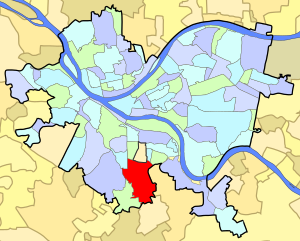Carrick, Pennsylvania
| Carrick | |
|---|---|
| Neighborhood of Pittsburgh Former Borough |
|

Wigman House, built in 1888, on Brownsville Road in Carrick
|
|
 |
|
| Coordinates: 40°23′49″N 79°59′13″W / 40.397°N 79.987°W | |
| Country | United States |
| State | Pennsylvania |
| County | Allegheny County |
| City | Pittsburgh |
| Incorporated | 1904 |
| Area | |
| • Total | 1.673 sq mi (4.33 km2) |
| Population (2010) | |
| • Total | 10,113 |
| • Density | 6,000/sq mi (2,300/km2) |
| ZIP Code | 15227, 15210 |
Carrick is a south neighborhood of Pittsburgh, Pennsylvania in the United States. It is served by two zip codes, 15210 and 15227, and has representation on Pittsburgh City Council by the council member for District 4 (South Neighborhoods) with a part in District 3.
Located between the suburbs of the South Hills and downtown, Carrick is well-served by public transportation. Once home to prominent mansions and wealthy families, the neighborhood currently has an affordable, solid housing stock and remains family-oriented.
Carrick is located on the southeastern edge of the City of Pittsburgh. It is situated atop a crest west of the Monongahela River. It is surrounded by (clockwise from the north) Knoxville, Mt. Oliver Borough, Mt. Oliver, St. Clair, Baldwin Borough, Brentwood Borough, Overbrook, Brookline, Bon Air.
Brownsville Road runs across the top of the crest and is the main thoroughfare through the neighborhood. The Carrick section of Brownsville Road is approximately 2.2 miles (3.5 km) long; it generally comprises three discrete business districts with residential areas in between.
Carrick was originally part of the land grant to Major John Ormsby from King George III in 1763 for his service during the French and Indian War. Carrick and Mt. Oliver were once known as the Ormsby Tract or simply Ormsby. The city of Birmingham was organized on this land by Ormsby's son in law Nathanial Bedford. It became known for coal mines and a glassworks in the Crailo area, also known as Spiketown, near the Presbyterian Church and Volunteers Field.
...
Wikipedia
